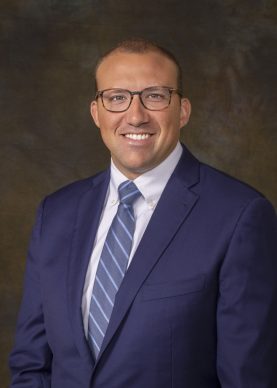Diagnosis and Treatment of Lumbar Disc Herniation in Wake County

What is Lumbar Disc Herniation?
The human spine has 33 bones, called vertebrae, that protect and support the spinal cord. Spongy, shock-absorbing discs act like cushions between the vertebrae. These discs can start to bulge or protrude against the spine’s nerve roots – and eventually rupture – causing pain or possible neurological dysfunction. When this happens in the lower back, it is called a lumbar disc herniation. While common, disc herniation can be a serious condition that requires medical treatment.

What Causes Lumbar Disc Herniation?
The two most common causes of lumbar disc herniation are natural aging/wear-and-tear and acute injury.
- Aging – As we age, the spongy discs between the vertebrae begin to decrease in water content and shrink. This is called disc degeneration. The degeneration process leaves discs more prone to protrusion or herniation.
- Acute Injury – An acute injury can also cause disc herniation. Common injuries like lifting or falls can place extreme pressure on the spinal cord, causing the disc to herniate.
Lumbar Disc Herniation Risk Factors
A lumbar disc herniation is not always preventable, but certain risk factors seem to play a role in causing it. These include:
- Age
- Genetics
- Being overweight and out of shape
- Frequent lifting of heavy objects
- Poor lifting mechanics
- Repetitive motions that affect the spine, like bending, pulling, or twisting
- Sedentary lifestyle
- Driving for long periods
- Smoking
Symptoms of a Lumbar Herniated Disc
A lumbar disc herniation does not always cause symptoms. However, when it is symptomatic, the condition may cause severe pain in the low back and lower extremities.
- Pain in the low back
- Muscle spasms in the low back
- Sciatica – shooting nerve pain that extends into the lower extremities
- Loss of sensation or strength in the lower extremities
- Decreased reflexes in the lower extremities
- Numbness and tingling in the lower extremities
- Bowel or bladder issues
How is a Herniated Disc in the Lumbar Spine Diagnosed?
A healthcare provider can diagnose a lumbar disc herniation through a physical examination and diagnostic testing.
During the physical exam, your provider will assess your reflexes, lower extremity strength, and ability to feel sensations. Weakness, loss of sensation, and absent reflexes in the lower extremities might indicate disc herniation. Diagnostic tests may include an X-Ray, MRI, CT-Scan, nerve conduction test, or EMG.

Treatment for Lumbar Disc Herniation
Most disc herniations will improve after rest, usually within a few days to several weeks. In addition to rest, your provider may recommend NSAIDs, muscle relaxers, ice, heat, physical therapy, exercise, and weight control.
Your orthopedic provider may also recommend an epidural steroid injection (ESI) into the area around the spinal nerves to reduce inflammation.
The primary treatment for a lumbar disc herniation is conservative management. If your lumbar disc herniation does not improve with six weeks of rest and conservative treatment, or you are experiencing severe neurological dysfunction like weakness or bowel and bladder incontinence, your provider will most likely recommend surgery.
The primary surgical treatment for a herniated disc is a discectomy or microdiscectomy. During a microdiscectomy, the surgeon will use a camera or microscope to make a small incision in your back and remove the portion of the disc that herniated and any other fragments affecting the nerves. In more severe cases, your orthopedic surgeon may need to remove the entire disc and fuse the vertebrae together.
Raleigh Orthopaedic has two ambulatory surgery centers where our surgeons perform discectomies as same-day, outpatient procedures using modern technology and minimally-invasive techniques.

Recovery Time After Discectomy
Recovery after a discectomy is usually quick. You may feel immediate relief, or it may take a few days or weeks. Your orthopedic provider will first recommend a simple walking program, home exercises to strengthen the back and legs, and physical therapy.
You should avoid lifting, bending, strenuous activity, and long car rides during the first two weeks of recovery. Most patients can return to work in 2 to 6 weeks.
How Can I Prevent Lumbar Disc Herniation?
A lumbar disc herniation is not always preventable, but there are some actions you can take to make it less likely. Orthopedic providers recommend keeping a healthy weight, exercising often, strengthening the core, having good posture, and using proper lifting mechanics, which can all help prevent lumbar disc herniation.

Expert Lumbar Disc Herniation Care at Raleigh Orthopaedic
Raleigh Orthopaedic has three board-certified, fellowship-trained orthopedic spine surgeons in Wake County who specialize in lumbar disc herniation. Whether your condition is mild or severe, our experts will form a treatment plan to get you back to positive health. Contact us today to schedule an appointment at one of our convenient clinic locations in Wake County, NC.

